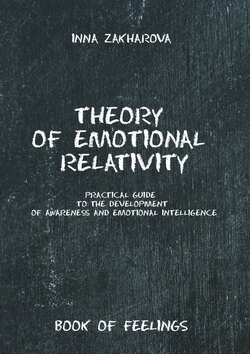Читать книгу Theory of emotional relativity. Practical guide to the development of awareness and emotional intelligence - Inna Zakharova - Страница 14
Values
Three Types of Joy
Оглавление1. Calmness
When we meet the values that relate to the need for security (support, knowledge, financial resources), we feel joy, it seems to confirm: “You do everything right, go ahead, do it again.” If it comes to security, then joy will be in the form of calm, lightness, relaxation. When you are in your fortress, there are people around who will support you, you know and possess information, there is enough money in your account – you are calm.
Security + value = calmness
2. Pleasure
When we meet with values relating to the need for love (intimacy, communication, compliments, attractive appearance), we will also feel joy, but in this case it will be in the form of pleasure, enjoyment. When you look at a picture that you like, you feel pleasure, when you communicate with a person who you like, you feel enjoyment.
Acceptance, attention + value = pleasure
3. Satisfaction
When meeting with values that relate to the need for respect (strength, justice, integrity, honesty, responsibility), we feel joy in the form of satisfaction. When you see your cool results that required commitment, you feel deep satisfaction from the work done.
Respect +value = satisfaction
Let’s look at the table and find out what a person with the leading need for security wants to be eager for and what he wants to get rid of.
Security
According to the list in the table, you can notice a values conflict, for example, stability and diversity, or care and freedom. Any diversity implies changes, except in situations when you, having diversity, choose the same. Care, however, implies a connection, and therefore, dependence on another person, and in this case, there can be no talk of complete freedom. There are special relationships with value rules. They are very necessary in order to understand how others should and will act, but I don’t want to act according to the rules myself, as this means a lack of choice and diversity, which are also values. When there are no rules, it’s also bad – chaos (anti-value) arises, you don’t know from whom and what to expect. It turns out that such people need rules and clear instructions, but they themselves violate them.
It turns out that a person with a leading need for security is often very controversial and indecisive, constantly doubting.
The list of values of a person with a leading need for love, acceptance, attention is given in the table below. There are practically no contradictions inside this table. With the exception of sincerity and image, often the image involves a certain embellished look. It turns out that a person with a leading need for love highly values sincerity, but does not want to show himself real.
Love
The third basic psychological need is respect. The values of a person with a leading need for respect are practically the opposite of the values of the need for love.
Respect
There are also practically no conflicts in this list, with the exception of a couple of justice and injustice. As justice is always subjective and is determined basically by systemic rules, it happens that, in an effort to restore justice, people with a leading need for respect are often not fair according to other people.
Let’s remember that all three needs are important for each of us, and look at all three tables with values. You may notice multiple conflicts. For example, autonomy satisfies the need for respect, but denies communication, which is very valuable for satisfying the need for love. And the availability of options, which is so important for satisfying the need for security, means evasion and unwillingness to make decisions that do not satisfy the need for respect. Only a good understanding of yourself, clear internal priorities and conscious goals allow you to resolve these internal conflicts and find the necessary balance among your needs. There are possible value conflicts in the table below. Columns indicate needs, and rows indicate conflicts.
It turns out that we are all constantly in a state of internal conflict. To resolve this conflict, we need emotional competence. Only emotions can show us the truth about ourselves if we learn to hear and understand them.
